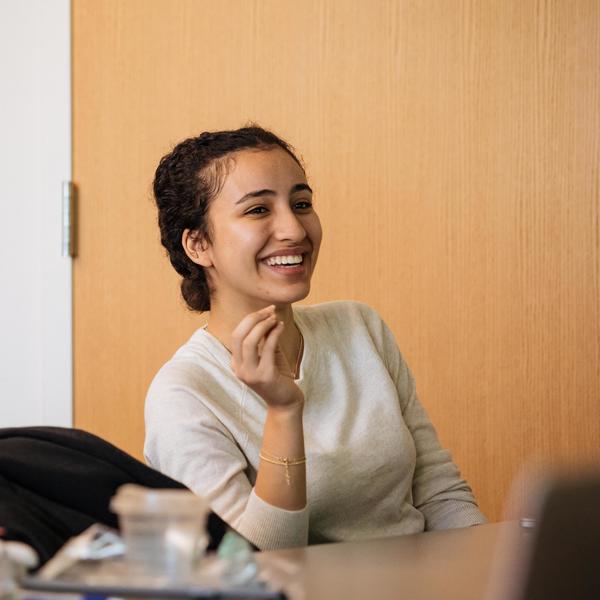This website uses cookies. Find out more in our Privacy Policy.
Engage with the social and intellectual challenges of our time using the intersections of religion and social justice as the foundation of your studies.
In this major, you'll learn to develop civil conversation around issues; critically reflect and assess personal and systemic problems as well as imagine possibilities for social change and transformation.
Religion has always had a powerful role in shaping ideas of social justice, oppression, and liberation. Religious authoritarianism can be used as a means of persecution, but social justice is also seen as a moral imperative in many faiths. Using a human rights framework and experiential learning through research and internships, you’ll study the relationship between religions and ethics, justice and issues related to gender, race, and class with a special emphasis placed on contemporary expressions of religious thought in cultures.

As a religion and social justice major, you’ll recognize and work with a variety of power dynamics in and out of the classroom, including diversity both as it appears in the classroom and in complex cultures that we study between religions and amongst religions and the relationship between religion and issues of gender, sexual orientation, sexual identities, race, and class. You'll learn:
Atlanta is a tremendous teaching and learning resource for religious studies students. Because of its own recent dramatic development at the cutting edge of the processes of globalization, the metropolitan area has become a working laboratory for studying the diversity of religious communities, beliefs and practices. Courses in this department typically include opportunities for field work where students may gain firsthand experience of how religious traditions are being renewed and transformed in these communities. In addition, the department offers significant opportunities for collaborative research with fellow students and faculty, colleagues and resource persons based at other Atlanta colleges and universities and the religious communities.
Religious studies is not the only department at Agnes Scott in which the ideal of learning community is honored by both faculty and students. However, the department has always striven to be among the most innovative and dedicated in seeking to make this ideal become a living reality. Some of its routines, such as the semi-annual departmental retreats, the departmental dinners opening and closing each semester, the ways in which students are empowered to participate in departmental decision-making regarding curriculum and academic policies and the many opportunities for community outreach work, remain uncommon and innovative.
Many religious studies students are involved in on-campus clubs and organizations, such as the Canterbury Club for Episcopalians, the Muslim Student Association, the Newman Club for Catholic Fellowship, New Life for Christian Fellowship, New Westminster Fellowship for Presbyterians, the Religious Life Council, the Spiritual Awareness Association, the religious studies honor society Theta Alpha Kappa, the Wesley Fellowship for United Methodists, WITKAZE, The Collective and others dedicated in various ways to the ongoing struggle for community and social justice. Religious studies also offers a retreat for its students to get to know one another on a personal basis.
Students with this major will graduate ready engage at the local and global level with a special emphasis placed on contemporary expressions of religious thought in cultures.
The world’s religions and their historic and future patterns of interaction are increasingly significant for understanding and responding to the issues of social justice occurring in a world undergoing the processes of globalization. Whether you follow a path of advocacy or faith-based activism, or allow the different perspectives of world religions to inform your other professional contributions, the foundation of a religion and social justice major will prepare you for a life of meaningful work.